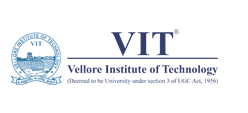School of Civil Engineering (SCE)

The Master in Civil Engineering programme is designed for professionals who are working in the Civil Engineering and related industries. Students will be able to acquire more advanced and in-depth knowledge and at the same time achieve intellectual broadening across the disciplines of Civil Engineering. The programme provides flexibility for students in the choice of modules to suit their ability, interests, and career advancement. The specialisations available are:
- Structural Engineering
- Construction Technology and Management
- M. Tech. Energy and Environmental Engineering (Offered till the academic year 2018-19)
Number of courses offered in Vellore-2, Chennai-1
M.Tech - Structural Engineering
The School of Civil Engineering offers M.Tech. programme in Structural Engineering to the candidates selected through VITMEE (VIT Masters Entrance Examination). The programme offers the students to (a) Analyze and design reinforced concrete structures and steel structures as per the standard design of codes; (b) Address the societal needs by interdisciplinary approach through advanced courses and get exposed to the latest technologies to be industry ready or to pursue advanced research; (c) Independently carry out research / investigation to solve practical problems and write / present a substantial technical report / document.
- Graduates will be engineering practitioners and leaders, who would help solve industry’s technological problems.
- Graduates will be engineering professionals, innovators or entrepreneurs engaged in technology development, technology deployment, or engineering system implementation in industry.
- Graduates will function in their profession with social awareness and responsibility.
- Graduates will interact with their peers in other disciplines in industry and society and contribute to the economic growth of the country. [5] Graduates will be successful in pursuing higher studies in engineering or management.
- Graduates will pursue career paths in teaching or research.
- Theory of Elasticity and Plasticity.
- Design of Concrete Structural Systems.
- Structural Dynamics.
- Finite Element Analysis.
- Advanced Design of Steel Structures.
- Matrix Methods of Structural Analysis.
- Design of Bridges.
- Experimental Stress Analysis.
- Machine Foundations.
- Prefabricated Structures.
- Stability of Structures.
- Advanced Concrete Materials and Technology.
- Advanced Foundation Design.
- Repair and Rehabilitation of Structures.
- Prestressed Concrete Structures.
- Earthquake Resistant Design.
- Application of Numerical Methods in Structural Engineering.
- Theory and Design of Plates and Shells.
- Analysis and Design of Tall Structures.
- Structural Optimization.
- Urban Planning and Sustainability.
- Offshore Structures.
- Energy Efficient Buildings.
- Survey Lab.
- Civil Engineering Computing Centre.
- Concrete Technology Lab.
- Strength of Materials Lab.
- Advanced Strength of Materials Lab.
- Structural Engineering Lab.
- Civil Engineering Non- Destructive Testing Lab.
- Environmental Engineering Lab.
- Fluid Machinery Lab.
- Geotechnical Engineering Lab.
- Transportation Engineering Lab.
- Heritage Research Lab.
- Structural Engineers in Government organisations such as SERC, CBRI, NAL etc.
- Design Engineers in companies such as L&T, STUP consultants, Godrej properties etc.
- Consulting Engineers in organisations like EIL, HCC, NBCC, etc.
M.Tech - Structural Engineering - VIT Chennai
M.Tech - Construction Technology and Management
The School of Civil Engineering offers M.Tech. programme in Construction Technology and Management to the candidates selected through VITMEE (VIT Masters Entrance Examination). The programme offers the students to (a) Acquire knowledge of construction materials, construction management, project management, contract legal requirement and management of funds; (b) Innovate in technology development, engineering system implementation and interact with their peers in other disciplines in industry and society; (c) Independently carry out research / investigation to solve practical problems and write / present a substantial technical report/document.
- Graduates will be engineering practitioners and leaders, who would help solve industry’s technological problems.
- Graduates will be engineering professionals, innovators or entrepreneurs engaged in technology development, technology deployment, or engineering system implementation in industry.
- Graduates will function in their profession with social awareness and responsibility.
- Graduates will interact with their peers in other disciplines in industry and society and contribute to the economic growth of the country.
- Graduates will be successful in pursuing higher studies in engineering or management.
- Graduates will pursue career paths in teaching or research.
- Construction Practices and Equipment.
- Modern Construction Materials.
- Construction Planning and Scheduling.
- Contract and Administration Planning.
- Construction Economics and Finance.
- Supply Chain Management (SCM).
- Computer Application In Infrastructure Management.
- Organizational Behaviour.
- Construction Personnel Management.
- Quality Control and Safety.
- Project Formulation and Appraisal.
- Infrastructure development and BOT, BOOT Projects.
- Estimating, Tendering and Bidding.
- Formwork for Concrete Structures.
- Prefabricated Techniques and Management.
- Green Building and Energy Management.
- Automation in Construction Industry.
- Construction Techniques of Steel and Concrete Composite Structures.
- Construction Techniques of Deep Foundations.
- Flexible and Rigid Pavements.
- Repair and Rehabilitation of Structures.
- Environmental Impact Assessment.
- Occupational Health and Industrial Safety.
- Urban Planning and Sustainability.
- Survey Lab.
- Civil Engineering Computing Centre.
- Concrete Technology Lab.
- Strength of Materials Lab.
- Advanced Strength of Materials Lab.
- Structural Engineering Lab.
- Civil Engineering Non- Destructive Testing Lab.
- Environmental Engineering Lab.
- Fluid Machinery Lab.
- Geotechnical Engineering Lab.
- Transportation Engineering Lab.
- Heritage Research Lab.
- Planning Engineers in companies such as L&T, STUP consultants etc.
- Consulting firms in roadways and railways projects etc.
- Research and Development organizations.
M. Tech. Energy and Environmental Engineering (Offered till the academic year 2018-19)
The School of Civil Engineering offers M.Tech. programme in Energy and Environmental Engineering to the candidates selected through VITMEE (VIT Masters Entrance Examination). The programme offers the students to (a) Acquire in depth knowledge to design, analyse and evaluate the environmental systems from the global and Indian perspective to provide sustainable solutions to the Environmental Engineering Problems, (b) Develop model, analyze and system simulation for performance evaluation and optimization of energy systems, (c) Independently carry out research / investigation to solve practical problems and write / present a substantial technical report / document.
- Graduates will be engineering practitioners and leaders, who would help solve industry’s technological problems.
- Graduates will be engineering professionals, innovators or entrepreneurs engaged in technology development, technology deployment, or engineering system implementation in industry.
- Graduates will function in their profession with social awareness and responsibility.
- Graduates will interact with their peers in other disciplines in industry and society and contribute to the economic growth of the country.
- Graduates will be successful in pursuing higher studies in engineering or management.
- Graduates will pursue career paths in teaching or research.
- Physicochemical, Biological Principles and Processes.
- Design of Water and Wastewater Treatment Systems.
- Environmental Quality Monitoring.
- Renewable Energy Technologies.
- Energy Audit, Conservation and Management.
- olid and Hazardous Waste Management.
- Environmental Geotechnology.
- Energy, Environment and Climate Change.
- Environmental Impact Assessment.
- Air and Noise Pollution Control.
- Advanced Wastewater Treatment.
- Mathematical Modeling in Environmental Engineering.
- Remote Sensing and GIS Applications.
- Occupational Health and Industrial Safety.
- Solar Energy Technologies.
- Alternative Fuels.
- Power Plant Engineering.
- Wind Energy Technology.
- Energy Systems Modeling and Analysis.
- Energy in Built Environment.
- Survey Lab.
- Civil Engineering Computing Centre.
- Concrete Technology Lab.
- Strength of Materials Lab.
- Advanced Strength of Materials Lab.
- Structural Engineering Lab.
- Civil Engineering Non- Destructive Testing Lab.
- Environmental Engineering Lab.
- Fluid Machinery Lab.
- Geotechnical Engineering Lab.
- Transportation Engineering Lab.
- Heritage Research Lab.
- Environmental and Energy Scientists in various R&D Organizations such as Tata&Steel, ISRO, DRDO etc.
- Environmental Engineers in various industries such as AECOM, WIPRO, BOSCH etc.
- Environmental Auditors/Energy Auditors / Consultants in L&T, DHI, TCE etc.

